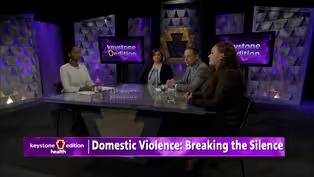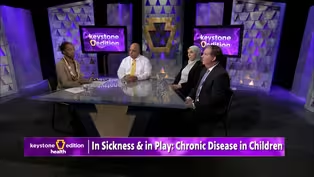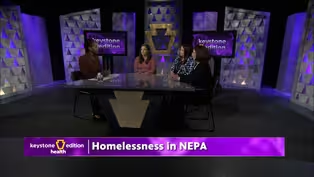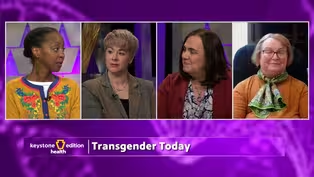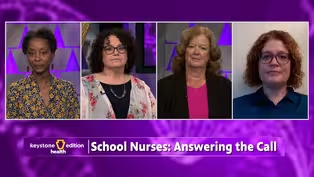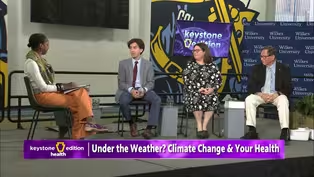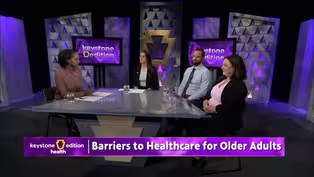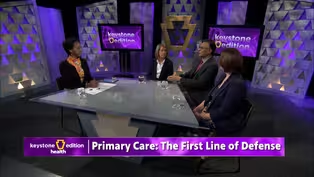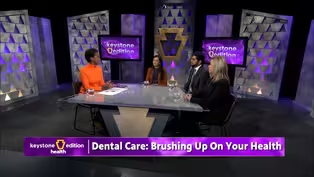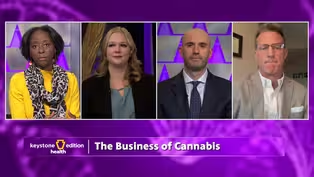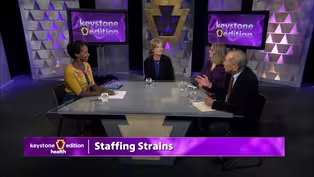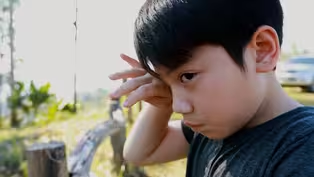Keystone Edition
The Smallest Victims: Child Abuse & Trafficking
1/30/2023 | 27mVideo has Closed Captions
What are the signs to know to spot child abuse and even possible trafficking?
The CDC reports at least 1 in 7 children experience child abuse in the United States. In addition, trafficking of children is on the rise - National Human Trafficking Hotline statistics showed a 25 percent jump in human trafficking cases from 2017 to 2018, and the National Center for Missing and exploited Children reported 1 in 7 runaways were likely victims of child sex trafficking.
Problems playing video? | Closed Captioning Feedback
Problems playing video? | Closed Captioning Feedback
Keystone Edition is a local public television program presented by WVIA
Keystone Edition
The Smallest Victims: Child Abuse & Trafficking
1/30/2023 | 27mVideo has Closed Captions
The CDC reports at least 1 in 7 children experience child abuse in the United States. In addition, trafficking of children is on the rise - National Human Trafficking Hotline statistics showed a 25 percent jump in human trafficking cases from 2017 to 2018, and the National Center for Missing and exploited Children reported 1 in 7 runaways were likely victims of child sex trafficking.
Problems playing video? | Closed Captioning Feedback
How to Watch Keystone Edition
Keystone Edition is available to stream on pbs.org and the free PBS App, available on iPhone, Apple TV, Android TV, Android smartphones, Amazon Fire TV, Amazon Fire Tablet, Roku, Samsung Smart TV, and Vizio.
Providing Support for PBS.org
Learn Moreabout PBS online sponsorshipMore from This Collection
Healthcare is constantly changing as technology finds new and better ways to help people live longer, healthier lives. Host Tonyehn Verkitus will address the issues that are important to the people in our community, including the ongoing pandemic, concerns about vaccines, food deserts, childhood trauma and child abuse, mental health, environmental issues, and the rising cost of staying healthy wit
Domestic Violence: Breaking the Silence
Video has Closed Captions
Access to the right resources can make facing this challenge a little easier for families (26m 59s)
In Sickness and in Play: Chronic Disease in Children
Video has Closed Captions
About 25% of children in the US aged 2 to 8 years have a chronic health condition (27m)
Video has Closed Captions
Homelessness can happen to anyone at any age or socio-economic status. (26m 59s)
Video has Closed Captions
As we raise the visibility on Transgender young adults and embrace them within our culture (26m 59s)
Video has Closed Captions
Obesity is a serious risk factor many try to avoid when developing healthy eating habits. (27m)
School Nurses: Answering the Call
Video has Closed Captions
What can our school districts do to help retain and recruit nurses for future generations? (27m)
Under the Weather? Climate Change & Your Health
Video has Closed Captions
How does climate change impact individual and public health? (54m 59s)
Barriers to Healthcare of Older Adults
Video has Closed Captions
What progress have local organizations made in addressing these challenges? (27m)
Primary Care: The First Line of Defense
Video has Closed Captions
When was the last time you saw your primary care doctor? (27m)
Dental Care: Brushing Up on Your Health
Video has Closed Captions
How can providers make dental care more affordable and accessible? (26m 59s)
Video has Closed Captions
What does the cannabis industry mean for Northeastern and Central Pennsylvania? (26m 59s)
Video has Closed Captions
Low staffing levels can lead to burnout among healthcare workers (27m)
Providing Support for PBS.org
Learn Moreabout PBS online sponsorship- [Announcer] Live from your public media studios, WVIA presents "Keystone Edition Health", a public affairs program that goes beyond the headlines to address issues in northeastern and central Pennsylvania.
This is "Keystone Edition Health".
And now, moderator Tonyehn Verkitus.
- Good evening and welcome to "Keystone Edition Health".
I'm Tonyehn Verkitus.
Thank you for joining us tonight as we discuss how to keep our children safe from the harms of abuse and trafficking.
But first, let's hear from WVIA's Paul Lazar.
- [Paul] At least one in seven children in the United States will experience child abuse, according to the Centers for Disease Control and Prevention, and trafficking of children is on the rise in recent years.
National human trafficking hotline statistics showed a 25% jump in human trafficking cases from 2017 to 2018, and the National Center for Missing and Exploited Children reports one in seven runaways were likely victims of child sex trafficking.
88% of those children came out of the foster care system.
Children in abusive situations need adults who know the signs of abuse to advocate for them and report potential abuse.
Experts believe early intervention and advocacy can prevent at-risk children from getting involved with trafficking.
For "Keystone Edition Health", I'm Paul Lazar.
- Joining us tonight is Dr. Quentin T. Novinger, MD; Ceil Bartoli, Licensed Clinical Social Worker at MMG Counseling in Dunmore; Christopher Shelly, Task Force Officer with the Stroud Area Regional Police; and Mary Kay Pivovarnik, Executive Director of CASA of Luzerne County.
Thank you all for joining us for this rather serious conversation that we're gonna have tonight.
I did do a little bit of reading on the topic, and I believe it says something like 7.2 million children are abused each year, which is I think a lot more children than we all believed this is happening to.
And I was wondering, Dr. Novinger, if you could start us off by telling us a little bit about ACEs and other childhood experiences and how they can affect health outcomes.
- Well, thank you for having us here today.
I think it's a very important topic, and we really hope to talk to the public about some of their opportunities to respond to this.
So the ACEs are from a study many years ago, and that stands for Adverse Childhood Experiences.
And it was a study that showed that children who are abused not only suffer from their acute injury, but have long-lasting effects and have increased mental health issues and other social issues, incidence of early death, is associated back with their experiences of being abused.
And so our effort here is not just to prevent a second bout of child abuse just to protect that child in an instant, but it's a long-lasting effect, we're trying to prevent that.
- So can you tell us a little bit about how Child Protective Services works, Ceil, and what the role is in the life of a child?
- Sure.
So we all have heard the term mandated reporter, and when we think about that, we think about a person who is working with children in their field of, in their work, and they are mandated to report if they have a reasonable cause to suspect that child is either being injured or neglected, or abused in any other way.
When that mandated reporter makes that call, it goes through what we call ChildLine, it's the statewide registry for child abuse.
ChildLine then directs that information to the local county Children & Youth.
In Pennsylvania, child welfare services are administered by each of the 67 counties.
Once that county gets that report, if it is an allegation of child abuse, it is assigned to an intake worker that will investigate and do a thorough assessment to see if that child or the family need any services, but specifically to see if that child is safe.
- [Tonyehn] Okay.
- So let me just underline something she mentioned in the beginning, and that's that we need to have a suspicion of a child being abused or neglected.
We don't have to have a diagnosis, or be 100% sure.
The suspicion is really what should initiate the call to ChildLine.
- So, Mary Kay, you're often working with children who have already been through this portion of the process and may be in foster care.
Can you tell us a little bit about what CASA does and the role of an advocate?
- Yes.
So, CASA advocates are court-appointed.
So they're all volunteers from the community.
They're court-appointed to a child or a sibling group who's been adjudicated dependent because of child abuse or neglect.
So at this time, the investigation's already been completed, and it has been found that something has happened to this child.
Some of our children are in foster care.
Some of them are in-home dependencies, which means they're at risk of being placed in foster care.
And what an advocate does is they're appointed to some of the most difficult cases, so the cases in which the judge wants an extra set of eyes on the child, or a doctor, or a Children & Youth, or a mental health provider who says, "This child really needs this additional person."
And the great thing about a CASA advocate is they have one child, whereas a case worker could have up to 30 cases with X amount of children on each case.
The CASA advocate has one.
So it's really great because the court appointment allows them to talk to doctors, dentists, mental health providers, teachers, foster parents, birth parents, Children & Youth to get the whole story and give a really good recommendation to the judge on what should happen with that child going forward.
- Dr. Novinger, can you kind of define child abuse for us?
I mean, there's different types, of course, and there are disciplines that happen within a household, but then there's abuse.
So, that difference.
- Well, we feel that the child abuse is the result of a child experiencing a non-accidental injury, neglect, sexual abuse.
But, the question of when they actually come forth is always a challenge, because we don't really know what's going on unless we can talk to the child or understand their environment.
- And if I can add, may I add?
- Yes, of course.
- In Pennsylvania, on the Child Protective Services Law, there are clear definitions for what is defined as child abuse.
Whether it is bodily injury, which is your physical type of abuse, or sexual abuse, medical neglect, severe medical neglect, or emotional abuse.
So there are each, there are very specific decisions, definitions.
And that is very different than discipline.
People get discipline and punishment mixed up, right?
Discipline is what we do with our children every day to give them structure and a schedule, right.
And at times, we might need to provide a consequence, punishment.
And what happens with child abuse is when that punishment becomes physical or out of control.
- Thank you.
Some children don't realize the severity of their abuse until well into adulthood.
That was the case for Sarah Isaac-Samuel, a Pennsylvania resident who now uses art to help herself and others heal.
- My cousin was the one that was sexually molesting myself and my sister.
And the first time I personally remember, I was four years old.
We wore these red polka dotted dresses.
My sister, later on in life, she had a a panic attack and she didn't understand why.
People will actually be able to completely block it out of their minds.
And she called me up, wanting to know what a red polka dotted dress meant.
Part of my story is that my stepmother was my trafficker.
But here's the crazy thing: Until I actually wrote my book, I didn't even know I was trafficked.
But in all reality, most of the times, 95% of the people that I've talked to, personally, have experienced it in their own homes, or by somebody who they're familiar with, like a family member or something like that, which is called familial trafficking.
When your stepmother is setting up sessions for you to go to a bus driver's home and have sex with him, and you know, do sexual things, like, that's what trafficking is.
And she was collecting the payments, or the benefits, when I was the one being abused.
Twigs came about from my own personal story.
Transformational art is what I call it, and it's for people who have experienced trauma, abuse, domestic violence, sex trafficking, where we use art as a tool to help people through the healing process of what they've experienced.
Art has always been part of who I am for my healing process.
And so I wanted to be able to share that with other people.
And we're creating something beautiful.
Even though some people think that they can't do art, they're kind of amazed when, you know, they have this great creation afterwards.
And so, yeah, it helps us refocus our mind from the bad to the good.
(gentle music) - Chris, I'd like to ask you a little bit about trafficking in our region.
Obviously, this is a focus for you.
Can you tell us what you're currently seeing here?
- Sure.
In 2014, Stroud Regional Police, the FBI, Monroe County District Attorney's Office, pretty much every law enforcement in Monroe County, started an investigation called Operation Rolling Stones.
During that investigation, our goal was to dismantle a gang, the Black P. Stones, that was operating in Monroe County, recruiting, at the time, we knew they were trafficking women, we knew they were selling drugs.
The investigation is still going on to this day, but is finally coming to an end.
With that investigation, we were able to indict over 50, 50-plus people, I think 20, 20 or 30 more state-wise, we were able to charge.
And during that investigation, we discovered not only were these women being trafficked by the Black P. Stones and other people affiliated, it's kind of a landmark case where we actually went after the hotel that was allowing it.
It was a Howard Johnson's in Barnesville.
We federally indicted the hotel owner, the manager, and the corporation.
It went to a jury trial, and thank God, the jury found all charges guilty, including the corporation, for allowing the gang to operate out of there to traffic the women.
She made a strong point, I think, when she said right there is that, "I didn't even know I was being trafficked."
And during my education of this trial, in talking to these victims, I would say the majority of our trafficking victims said the exact same thing, that they didn't even know they were being trafficked.
And in order to charge someone with trafficking on our federal statute, it's going to be force, fraud, or coercion.
Most people think it's just force.
They put a gun to your head and you're locked up in a hotel room.
A lot of these girls were free to go back home, see their families.
I won't say "free to go", but with them being brainwashed, they would return.
It's also very drug-driven in this community.
When I mean drug-driven is a lot of these girls become addicted, or these gangs force them to become addicted to a drug.
So now they're dependent upon that drug.
And what the trafficker will do then is withhold that drug from them, or actually sometimes use the drug so they can stay awake longer and make more money.
A little bit of both.
So it's very violent.
And this is in the Poconos.
So this wasn't, you know, in another country, this wasn't far away; this was right here.
So unfortunately, trafficking is right in front of us.
And with the internet and the access for availability for people to meet the way they can meet, it's going to be an uphill battle.
Again, when you sell a drug, you have to get a commodity, you have to sell that drug.
So you have to find a source and sell that drug.
Someone's body you can sell over and over and over again.
And it's huge money.
And these people are learning that, they know that.
And I think it's gonna surpass the drug market.
Human trafficking, as you know, an illegal activity for illegal proceeds, it's gonna be the number one, I believe it's number two right there, and drug dealing is number one right now.
It's going to surpass that.
- Wow.
Mary Kay, I know some of the children that your advocates work with have either been trafficked or they're in the process of being groomed.
Can you talk a little bit about that?
- Sure.
I think it's really important for people to see the signs of grooming in youth, particularly youth who are in foster homes or group homes, anything like that, where they're away from their families, or even if they are with their families.
A lot of times these traffickers will groom them and give them things that they want that they normally can't get.
Like you look for things like expensive purses, electronics, sneakers, clothing, anything like that that's out of the ordinary for a youth to have.
So that's something that our advocates can look at when they're meeting with the children and seeing the children on a regular basis.
When they notice, "Hey, they have a really expensive purse," or, "They have these really nice new sneakers," and you know, talk to them on where they got that from.
And many times, they'll say, you know, "I met someone on the internet, they're sending these things to me."
Because these youth are looking for love.
So they equate those things with love.
And therefore, when they get them, they enjoy it and they get, you know, bought into this lifestyle.
And then these people say, "Well, if you come with me or you meet with me, I'll take you on a shopping spree."
Or, "This will be what the rest of your life will look like."
And it's very easy for these youth to want to get involved in that because of the situations that they're coming from.
And really they're just looking for acceptance.
So as he had said, you know, these are gangs a lot of times that are doing this business and doing this job.
And one of the other important things I want to stress is it's not just females, it's also males.
And definitely, the LGBTQ community, they are really pinpointed in this.
So please watch for it in males as well as females, anyone who maybe is acting differently or spending their time differently.
It's really important to pay attention.
- And Dr. Novinger, and you might want to speak to this too.
She's saying to pay attention.
What sort of signs are you looking for specifically in a child that may be abused, maybe sexually, may be trafficked?
- Well, as far as the trafficking goes, there are things that you would expect any person, any child to know, like their birthday, and where they you know, grew up, some details about their lives, which people who are not trafficked would be able to come up without any difficulty.
Other things are frequent pregnancies, frequent sexually transmitted diseases.
One thing that we look for are tattoos.
You know, tattoos are very popular today.
Everybody has a tattoo, except for me, but.
(laughs) But people have tattoos for a reason.
They're memorializing something, they're celebrating a singer.
And so if they have a tattoo and they're either unwilling or unable to identify what that tattoo means, you know, that's a red flag I'd be concerned about.
So I have to say, Ceil talked before about reporting, for mandated reporters.
On the other side, anyone who has a suspicion of a child being victimized, trafficked, sexual abuse or physical abuse, can call ChildLine and make that report.
And those reports are also taken in the state and acted upon.
So it's important, you know, we're talking about some of these signs today.
If something like that turns up and you call it in, someone will pay attention to that.
- Please.
We are all, child abuse, for us to protect children, it takes a community.
It takes the community to be involved, make that call of, yes, there are mandated reporters, but there are also what we call permissive reporters, you and I.
You see something, place the call to ChildLine.
The number is 1-800-932-0313.
- We'll definitely ask you to share that again, just to make sure.
But I also wanted to talk a little bit about the perpetrators.
There's probably certain signs you can look for, things that you would detect in someone who is perpetrating abuse or trafficking.
Can either one of you speak to that?
- Well, I think, the doctor made a good point there, just kind of going back to the tattooing.
It's called, what they do is these gang members will brand them, if you will.
That's the term they use.
And they'll have, I just want to touch upon that quickly.
And I remember the one victim's tattoo was, it had money symbols, like it was like money signs, and then it had the trafficker's name, instead of property, "Property of" and the trafficker's name.
So I mean, obviously, that is a huge red flag, just, you know, for general information right there, with the tattoo part of it.
But that was, I think that was very good, doctor, you said that they don't know what the tattoo means.
And that's a strong point right there.
As in for our suspects, I mean, it's anybody and everybody.
I've, it's there's really.
So we had a case that was involved with Florida, and they were down in, I wanna say Tampa, Florida.
And the case drew us down to Tampa, Florida.
And what the trafficker was doing, he was transporting his two victims.
One was mentally handicapped, and the other one he was using as, she was trying to get her child back, it was child custody.
And he said he was gonna hire an attorney to help her.
And he ran it as an escort service, kind of a modeling agency.
So he got the two victims, and they would actually travel from Florida up to Monroe County here, in the Poconos.
And the reason was is 'cause competition was so stiff down there.
That was the only reason that they would come up here.
So they're looking for places that they're gonna make quick money.
And so, it's not always big.
You're thinking Atlanta, you're thinking these big places.
No, they're coming to small places, 'cause that's where the money's at, because of supply and demand.
As for the pedigree of these, there really isn't any.
It's all shapes, all colors, it's all ages.
There's really no, the best bet to combat and go after the traffickers is to identify the victims, and then go from there.
Obviously, gangs are always at the top front, that we're always gonna suspect that.
They're up to illegal activity, and I believe human trafficking is probably one of their biggest economic plays right now.
But with that being said, it's identifying the victims and then going after the traffickers I think is the best way to combat that.
There's really no pedigree per trafficker.
- And if we are looking at some perpetrators and what are some signs that we might look for?
One of the things I always think about in child abuse when we're looking at physical abuse, if you know someone who is hurting animals, they're probably going to hurt children.
If you know someone with a child who has, seems to have severe anger management issues, or mental health issues, drug abuse issues, that is a concern for their ability to take care of that children.
If you know someone who really does not have an idea of child development, a lot of child abuse occurs around child development milestones.
So you can see a lot of child abuse around the two year-old and potty training, frustration because the child's not potty-trained yet.
And not having an understanding of what that developmental milestone is.
So when you're looking at potential perpetrators, you're looking at, like I said, several things from mental health to drug and alcohol to anger management to, and again, if they're hurting animals, they're hurting children, yeah.
- So what you're saying is that mothers or parents of those young children have unrealistic expectations about their ability to toilet-train, or their ability to respond to any discipline.
And they may very well never have had any experience with what we consider a normal household.
- [Ceil] Right.
- Or normal discipline like many of us were.
So they have nothing to compare that with.
Now we're explaining that.
That doesn't mean it's okay, (laughs) because we really need to protect those children and prevent future abuse.
And that's really our role.
- I think people don't want to believe this, but just as she said, with her artwork and you know, her book, that she was being trafficked by family.
It was family.
And that is not unheard of.
That's actually, I wouldn't say, but for children-wise, I think that's more common than not.
So as we don't want to believe as a society that there's no way a mom or a dad would ever traffic their own child, it does happen.
So with that being said, I think people that kind of have that Spidey sense that something's wrong, but they don't want to believe it, they might be dead-on.
- I want to talk a little bit about shaken babies, because you were just talking about discipline, and I know sometimes, or that's often the cause that children, small babies are showing up with concussions, I believe.
Can you talk a little bit about that?
- Well, it's more than a concussion.
- Right.
- But, so what we found, Dr. Mark Dias, who's a neurosurgeon at Hershey, did a study a number of years ago, and asked new parents if they thought shaking of a baby was okay.
And over 20% thought it was okay.
And I have to say this really loud: Shaking a baby is never okay, ever.
But what we found is that out of frustration, they're not really mature enough to handle an infant like that, that they respond in a violent way.
And that's what shaking really is.
So when a baby is shaken, it's something that we believe occurs where they're taken back and forth about five or six times.
And what happens is that the brain, which is encased in the skull, is shaken forward and backward and forward and backward.
And that results in injuries to the neurons in the brain called diffuse axonal injury, because the neurons are sheared.
This is scary, isn't it?
- [Tonyehn] Yeah, yeah.
- And they have bleeding in the brain and actually outside the brain.
And this results in residual type of injuries that will last a lifetime, and they're at high risk for dying.
So we know the pathophysiology of this, and when they're shaken, we do everything we can to care for them, but we really need to do something before they're shaken.
- Yes.
An intervention of some sort with the family, obviously.
- [Dr. Novinger] Yes.
- I wanted to talk a little bit about the advocates themselves.
How does one become an advocate?
I would imagine you could use plenty of advocates, based on what I'm hearing.
So what's that process?
- Yes, there can never be enough advocates.
I can't say that enough.
The process to become an advocate is they would contact the CASA agency, so for us, it's luzernecasa.org and we have a nice button there that you can click to say Volunteer, you put your information in, and we contact you.
We do an information session, which is thorough.
So it goes over everything that's expected of you as an advocate.
You know, how many hours are expected of you, visiting the child, all of the components of it.
And we also talk to the advocates realistically about the cases that they're going to see.
Because as you can hear, we're talking about some pretty serious things here.
And the advocates are going to encounter those things, and many times, they have never experienced those in their lives.
So the advocate coordinators and myself really help them through those processes.
But we try to match them with a child that they would most like to be matched with.
So if there's something that's really, that they don't think they could deal with, we wouldn't match them with that child.
So then what they do is they go through a training, it's a nine-week long training, three hours a night for nine weeks.
So it's very extensive.
We go through the court system, we go through child abuse and neglect.
We actually go through photos of, "If you walked into this home and saw these things, what would you think?"
We talk about mandated reporting, because our advocates are mandated reporters as well.
So it's a really long, lengthy process.
So when you're done, you're ready.
We assign them a case, and then we guide them through the case.
And they do do a court report for the judge.
They do testify in court.
So it's an intense process, but it's a wonderful process.
And there's so many CASAs who grow.
And I always say our CASAs are really the best community members, because they learn so much about their community, and everything that's out there to offer and all of the services.
So it's just a great experience.
- And just out of curiosity, how long might the relationship be with a child?
- So, it's interesting.
Our cases really can go anywhere from six months, and I would say they average at two years.
We currently have a CASA who has been on the same case for six years.
- [Tonyehn] Oh, wow.
- That's not normal, but it's wonderful.
She's stuck with this child for the entire time.
But they usually last about two years, until some type of permanency happens.
If the child chooses to continue the relationship, they can continue a relationship after the case closes.
And sometimes that happens, and they have a lifelong relationship after that.
- Thank you, and thank you all for sharing all the information that you shared tonight.
Everyone, please make sure that you write down that ChildLine number somewhere.
But thank you to all of our guests for their insights, and to all of you for joining us.
For "Keystone Edition Health", I'm Tonyehn Verkitus.
Have a good evening.
(gentle music)
The Smallest Victims - Preview
Preview: 1/30/2023 | 30s | Watch Monday, January 30th at 7pm on WVIA TV (30s)
Providing Support for PBS.org
Learn Moreabout PBS online sponsorship
- News and Public Affairs

Top journalists deliver compelling original analysis of the hour's headlines.

- News and Public Affairs

FRONTLINE is investigative journalism that questions, explains and changes our world.












Support for PBS provided by:
Keystone Edition is a local public television program presented by WVIA
